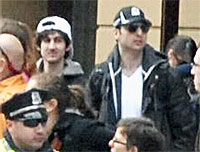Jihadist Websites Played Role in Boston Bombing

(Moscow Times – themoscowtimes.com – Ivan Nechepurenko – April 25, 2013) As more evidence surfaces that the Boston bombing suspects were motivated by a radical version of Islam learned largely from jihadist websites, the monitoring of such websites may prove to be the starting point for closer cooperation between the U.S. and Russia on security issues.
The surviving suspect of the attack, Dzhokhar Tsarnaev, told investigators that he and his brother frequently read Inspire, an English-language online magazine established by one of al-Qaida’s chief masterminds, Anwar al-Awlaki, with the goal of radicalizing young Muslims in the West to carry out simple individual attacks.
Yoram Schweitzer, NATO’s consultant on counterterrorism and a prominent authority on al-Qaida’s propaganda efforts, believes that the case of the Tsarnaev brothers is not exceptional at all: “These media outlets and websites are spreading like mushrooms; they specifically target youngsters who are either radicalized by them or are being driven to these materials by their own alienation from society,” he said by phone Wednesday.
Schweitzer said he did not have exact data on how many radical websites are currently active and how many people visit them.
In its summer 2010 issue, Inspire published instructions on how to make pressure cooker bombs, the same kind of explosives that investigators believe were used in the Boston bombing attack, under the headline “Make a Bomb in the Kitchen of Your Mom.”
Both Russian and U.S. authorities have made an effort to monitor radical materials on the web, often raising privacy and human rights concerns.
According to a report published by Agentura.ru, a think tank on Russia’s security services, the Federal Security Service has started using analytical research software to monitor the Internet, including blogs and social networks, for radical content.
These systems use keywords to analyze Internet content, but the volume of possible suspects is so high that it becomes increasingly difficult to distinguish a real threat from a false one.
“It is very unlikely that someone will announce on the Internet that he is going to plant a bomb in a public place. These systems still have to be operated by human beings, who are ultimately the ones to make decisions about which case to follow and which one to dismiss,” said Irina Borogan, one of the co-founders of Agentura.ru.
She also noted that there is a thin line between using Internet monitoring for security purposes and using it against the political opposition.
Russia has a list of extremist websites banned by court rulings. The Kavkaz Center, a news agency run by Chechen insurgents to promote Chechnya’s independence from Russia, is on the list, which as of Wednesday contained 1,802 listings.
Kavkaz Center, which has been a target of repeated hacker attacks that some say were committed by the FSB, publishes information in Russian, English, Ukrainian, Arabic and Turkish.
In addition, numerous jihadist accounts have been opened on social networks that promote the Islamic cause and call for fellow Russian-speaking Muslims to join the war against Bashar Assad in Syria.
The Tsarnaev brothers seem to have been inspired mostly by their historical affinity with the North Caucasus, but this was only a trigger that brought them toward radical Islam. According to Schweitzer, “anything, Syria, Mali or Afghanistan,” could have just as easily replaced Chechnya or Dagestan as the spark.
More importantly, however, is that the Boston bombings indicate a trend toward more decentralized radical activity that is largely based online.
Tamerlan Tsarnaev, the older brother and the purported mastermind of the attacks, was placed on the U.S. Terrorist Identities Datamart Environment database of suspected international terrorists, but the half a million other names on the list made it unlikely for his activities to be closely monitored.
“Security services are aware of how extensive this field is and that it is almost inevitable that people will go unnoticed, but looking back, they can see what areas they can focus on,” Schweitzer said.
Tsarnaev was included in the potential terrorists database as a result of Russia’s warning that he was connected with Islamic radicals.
At the U.S. Senate Intelligence Committee briefing held after the bombing, communications failure between Russia and the U.S. was cited as one of the reasons why the suspects fell off the FBI’s radar.
